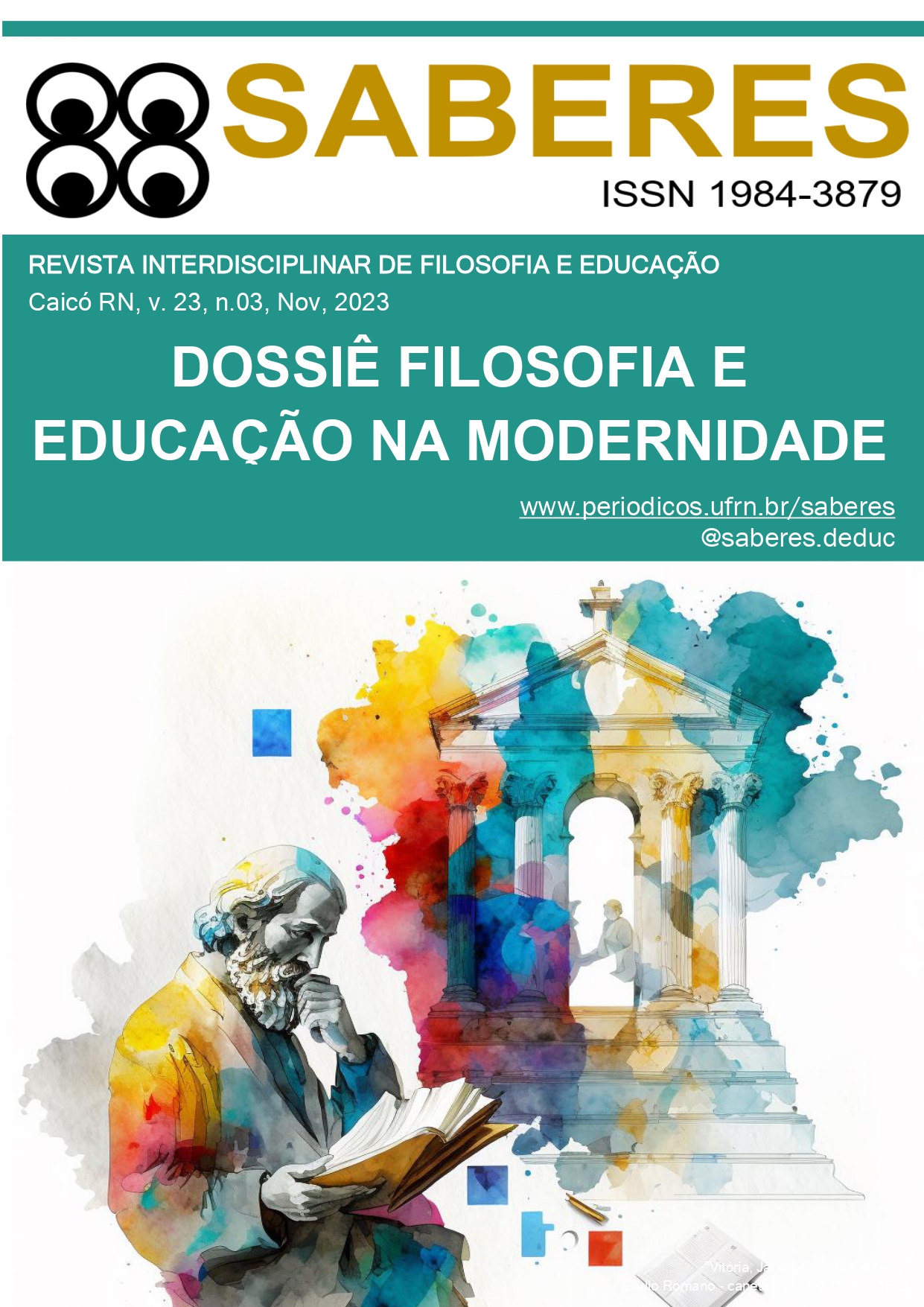ESTADO DE NATUREZA, CONTRATO SOCIAL E ELOQUÊNCIA NA FILOSOFIA POLÍTICA DE THOMAS HOBBES
DOI:
https://doi.org/10.21680/1984-3879.2023v23n3ID33580Palavras-chave:
Hobbes; Beligerância; Contrato Social; Eloquência.Resumo
Este estudo de cunho bibliográfico e teórico, objetiva primordial analisar a relação das ideias arquitetadas e denominadas por Thomas Hobbes como estado de natureza, contrato Social e eloquência, desta última, analisando a sua habilidade retórica. A primeira ideia denota um estado anterior à constituição da sociedade civil. Seria uma hipótese em que haveria guerra e competição entre os sujeitos, justificada pela ausência de um ser que personifique o poder soberano. Nesse contexto, cada pessoa busca seus interesses pessoais, resultando em uma vida insegura e instável. Para escapar desse estado caótico, Hobbes propõe um contrato, no qual os indivíduos concordam em desistir da liberdade e autorregulação em prol da proteção de um soberano absoluto que os governe. Na sustentação do referido acordo social, está o talento da habilidade retórica da eloquência, que entraria como auxiliar da razão, moldando as paixões dos súditos em prol da obediência civil. Na conclusão, é percebido que o contrato hobbesiano constitui a autoridade do soberano, mas não é o suficiente no que tange impedir o retorno ao estado beligerante sem o uso da habilidade retórica da eloquência na mente da população como reforço a obediência civil.
Downloads
Referências
BRAGA, Lélio Favacho. A Eloquência no Pensamento Político de Thomas Hobbes. 2010. 81f. Dissertação (Programa de Pós-Graduação em Ciência Política) – Universidade Federal do Pará, Belém (PA), 2010.
BERNARDES, Júlio. Hobbes & Liberdade. Coleção Passo-a-Passo. Ed. Jorge Zahar, Rio de Janeiro, 2002.
COTRIM, Gilberto. Fundamentos da Filosofia, História e Grandes Temas. Ed. Saraiva, São Paulo, 2000.
GINZURG, Carlo. Medo, Reverência, Terror: Quatro ensaios de iconografia Política. Tradução Federico Carotti, Joana Angélica d’Avila Melo, Júlio Castañon Guimarães — 1ª ed. —São Paulo: Companhia das Letras, 2014.
HOBBES, T. Os Elementos da Lei Natural e Política. Trad. Fernando D. Andrade. São Paulo: Ícone, 2002.
________. Leviatã ou Matéria, Forma e Poder de um Estado Eclesiástico e Civil. Tradução de Rosina D’ Angina. Ed. Martin Claret, São Paulo, 2009.
HOBBES, T. Do cidadão (1642), Trad. Renato Janine Ribeiro. (Coleção Clássicos). São Paulo: Martins Fontes, 1992.
________. Leviatã ou Matéria, Forma e Poder de um Estado Eclesiástico e Civil. Coleção Os Pensadores. (1º volume). 4ª Edição, Nova Cultural, 1988.
________. Leviatã. São Paulo: Abril Cultural (Os Pensadores), 2. ed.,1979.
MANENT, P. História Intelectual do Liberalismo: dez lições. Rio de Janeiro: Imago, 1990.
MAQUIAVEL, N. O Príncipe. Tradução de Maria Júlia Goldwasser. São Paulo: Martins Fontes, 2007.
QUIRINO, Célia Galvão e SADEK, Maria Tereza. O Pensamento Político. Clássico. 2ª edição. Ed. Martins Fortes, São Paulo, 2003.
RECIO, Encarnación Moya; NASCIMENTO, Paulo Roberto. Introdução a Ciências Políticas: teoria, instituições e autores políticos. Rede For, São Paulo, 2012.
RIBEIRO, Janine Renato. Hobbes: o medo e a esperança. In: Os clássicos da política, org. Franscisco C. Weffort, Ática, São Paulo 2008.
WEFFORT, F. C. Os Clássicos da Política. (1º volume). 4ª Edição, São Paulo: Ática, 1993.
WOLFF, J. Introdução à Filosofia Política. 2º Edição, Lisboa: Gradiva, 2011.
Downloads
Publicado
Como Citar
Edição
Seção
Licença
Copyright (c) 2023 Saberes: Revista interdisciplinar de Filosofia e Educação

Este trabalho está licenciado sob uma licença Creative Commons Attribution-NonCommercial-ShareAlike 4.0 International License.
Este obra está licenciado com uma Licença Creative Commons Atribuição 4.0 Internacional.
Autores que publicam nesta revista concordam com os seguintes termos:
a. Autores mantém os direitos autorais e concedem à revista o direito de primeira publicação, com o trabalho simultaneamente licenciado sob a Licença Creative Commons Attribution 4.0 que permite o compartilhamento do trabalho com reconhecimento da autoria e publicação inicial nesta revista.
b. Autores têm autorização para assumir contratos adicionais separadamente, para distribuição não-exclusiva da versão do trabalho publicada nesta revista (ex.: publicar em repositório institucional ou como capítulo de livro), com reconhecimento de autoria e publicação inicial nesta revista.
c. Autores têm permissão para publicar e distribuir seu trabalho online (ex.: em repositórios institucionais ou na sua página pessoal) após a publicação inicial nesta revista, já que isso pode gerar alterações produtivas, bem como aumentar o impacto e a citação do trabalho publicado (Veja O Efeito do Acesso Livre).
Foram feitos todos os esforços para identificar e creditar os detentores de direitos sobre as imagens publicadas. Se tem direitos sobre alguma destas imagens e não foi corretamente identificado, por favor, entre em contato com a revista Saberes e publicaremos a correção num dos próximos números.


 English
English Español (España)
Español (España) Português (Brasil)
Português (Brasil)



